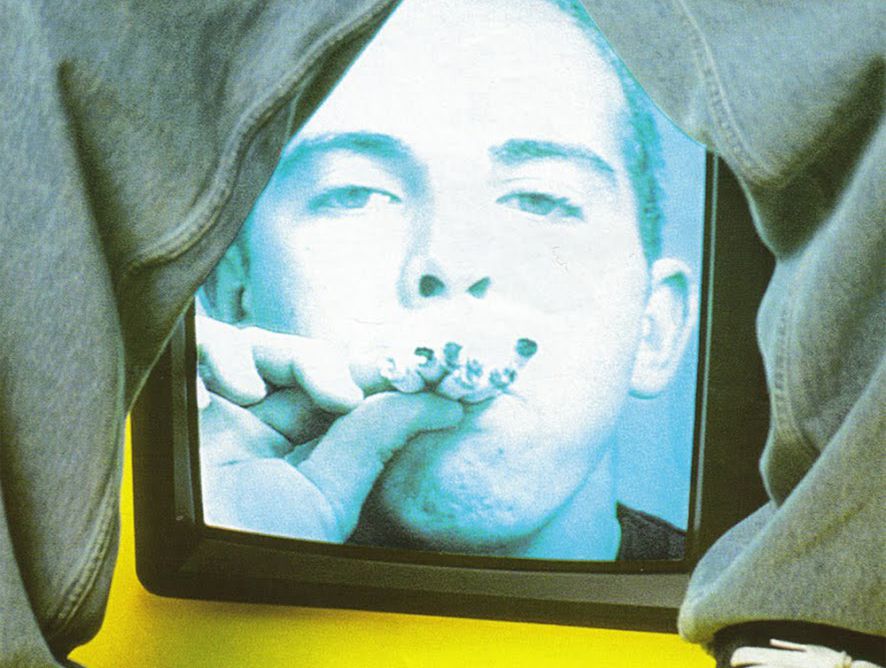Ronnie Bertino was on par with any pro from his era. He skated for Blind and Plan B, arguably the best companies at the time. He innovated skating with moves like switch backside 360s and switch back lips down handrails. He made money, and traveled the world. Like many who have it all at an early age, Ronnie has also gone through turbulent times. He’s dealt with the death of a friend and mentor, sponsorship troubles, problems with alcohol, and even major tax issues. Through the highs and lows, Ronnie has endured and still remains a part of skateboarding today.
48 Blocks: I first remember you from the first Think video skating EMB. That part really stood out at the time. Where are you from originally, and how did you end up in SF riding for Think?
Ronnie: I was born in Granada hills, which is Los Angeles County. I have lived all over SoCal my whole life. As far as how I ended up in SF, I rode for Venture at the time. Keith Cochrane and Greg Carroll were involved with Venture, and did Think. I thought, “Hey, a new company, and an opportunity to be part of it from the start.” I had a chance get on Powell when Adam McNatt and Pat Brennen did. But for some reason, I decided to do something else other than be on a company that was already established and huge at the time. I felt I would have got lost in the mix. Something new sounded good.
48 Blocks: How did the transition from Think to Blind go down?
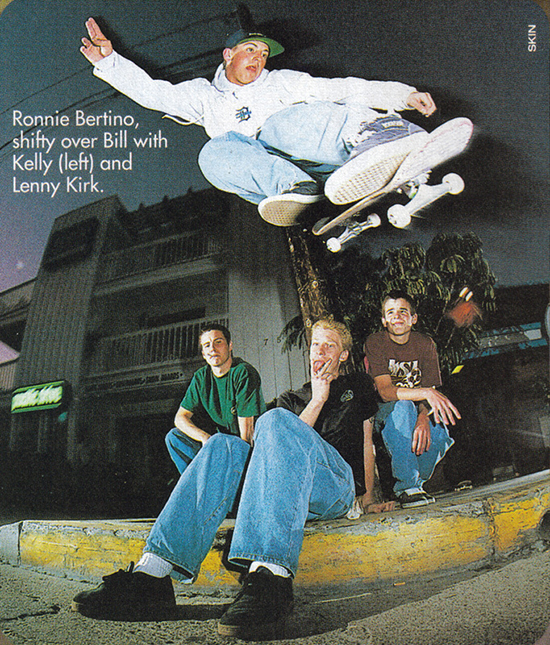 Ronnie: I was in SF at the time, and skating Embarcadero a bunch. One day at a morning session at EMB, Henry Sanchez was out there and said I am going to talk with the other dudes. He pretty much wanted to get me on Blind. I couldn’t believe it. You got one of the most innovate skaters pretty much saying that you are good enough to get on the team he is on. It was a true honor and a privilege.
Ronnie: I was in SF at the time, and skating Embarcadero a bunch. One day at a morning session at EMB, Henry Sanchez was out there and said I am going to talk with the other dudes. He pretty much wanted to get me on Blind. I couldn’t believe it. You got one of the most innovate skaters pretty much saying that you are good enough to get on the team he is on. It was a true honor and a privilege.
48 Blocks: What was it like being on Blind in the heyday? What memories stand out from that World / Big Brother era?
Ronnie: It was great! Skating with Guy, Rudy, Tim, and Henry was insane. I pretty much skated with the best of the best. I think skating then was more pure. We didn’t have parks like there are today. So that made it more interesting. And the spots we were finding were brand spanking new legit street spots. Anytime I ever went to a spot with them that was new, something always went down because we were all so excited about some new shit to skate. Big Brother was cool, definitely different from any other magazine at the time, and even now.
48 Blocks: Somewhere after the “Friends” part in Virtual Reality and the release of Second Hand Smoke, you switched from Blind to Plan B. Was this after everyone left for Girl? How did all of that go down?
Ronnie: Some dudes on Plan B weren’t happy, and some dudes on Blind weren’t happy. So they decided to do their thing. I mean I was bummed because I had been on Blind maybe for two years at the most, and just watched it fall apart. But I guess people have reasons to do things, and that’s what the outcome was. I mean honestly, Blind was such a tight click before I was even on it. Those guys had known each other for years, and I was kinda like the new dude on the team. There were no bad vibes or anything. But, in a way, I felt I really didn’t fit in. In the end, I have nothing but respect for all those dudes, and think they did what they felt they had to do to move forward. I don’t think anyone can hate on them for that.
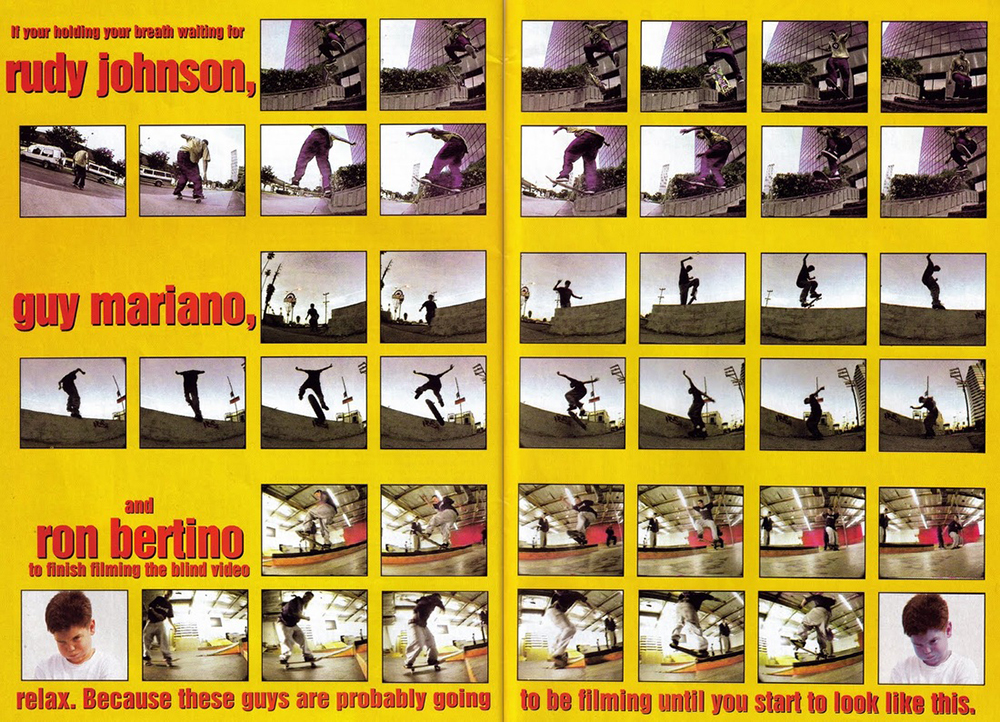
48 Blocks: After the tragic passing of Mike Ternasky, the original Plan B eventually shut down. What was going on with you at that point, and how did you end up hooking up with ATM?
Ronnie: Well, the passing of Mike T was most definitely sudden and tragic. We had been in the middle of filming Second Hand Smoke. The last time I saw him was in Canada. He had a lot of plans for us for the video, and what we were going to do as a company after the video was released. I had gotten back home to San Diego—I was staying in Pacific Beach with friends—and the next morning John Drake tells me that he heard the worst news ever. Mike T had died. I was just with him in Canada the day before, and thought it was a fucked up rumor. He said no. Sal Barbier lived close by, so I skated over there. Sure enough, Sal was in there with the blankest look on his face, and said it was true. I couldn’t believe it. One day hanging out with him talking about how sick things are going to be with the company, and the next day he’s dead. Skating lost a big piece of the puzzle in my eyes with the passing of Mike Ternasky.
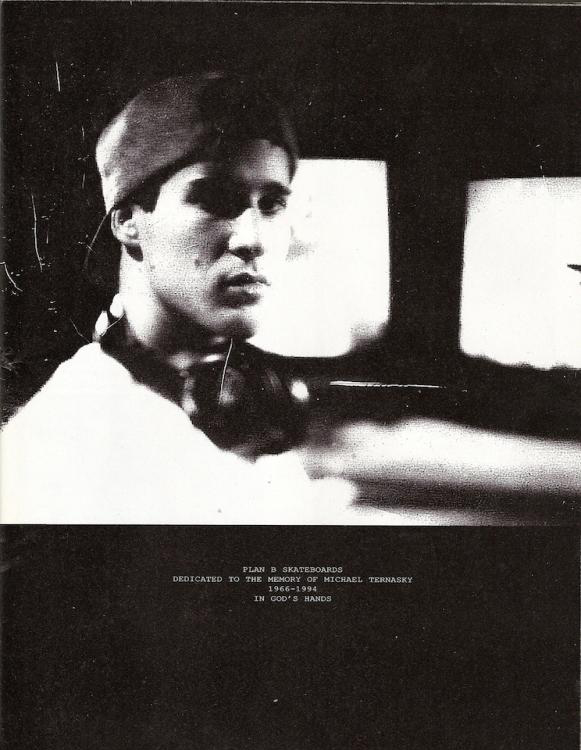 After all that, I didn’t have a sponsor for a while. I was getting decks here and there from people, and still skating a bunch. I think I was holding out for one, and not too many people were hitting me up for two. With Plan B, and Mike T being the guy who ran it, there was more to it than just skating for a team. It was the closest thing to a skate family that I had, and the most I had ever felt at home with a skate team. Anyway, I ended up holding out for a bit. I actually went to Tampa Pro without a board sponsor and qualified first, probably the best I ever did at a pro contest. It was cool. I ended up getting on 23 because of Sal, and did that for a bit. But it ended up not working out. They moved on and did Aesthetics. But I never got a call. So in the end, I was only sponsored by Orion. I just started drinking and getting into partying more than anything, and slowly faded away. Brian (Ridegway from Orion) still payed me, and I have to give him a lot of love for that. At this point, new kids and the skating were surpassing me. He still helped me out until he couldn’t anymore.
After all that, I didn’t have a sponsor for a while. I was getting decks here and there from people, and still skating a bunch. I think I was holding out for one, and not too many people were hitting me up for two. With Plan B, and Mike T being the guy who ran it, there was more to it than just skating for a team. It was the closest thing to a skate family that I had, and the most I had ever felt at home with a skate team. Anyway, I ended up holding out for a bit. I actually went to Tampa Pro without a board sponsor and qualified first, probably the best I ever did at a pro contest. It was cool. I ended up getting on 23 because of Sal, and did that for a bit. But it ended up not working out. They moved on and did Aesthetics. But I never got a call. So in the end, I was only sponsored by Orion. I just started drinking and getting into partying more than anything, and slowly faded away. Brian (Ridegway from Orion) still payed me, and I have to give him a lot of love for that. At this point, new kids and the skating were surpassing me. He still helped me out until he couldn’t anymore.
One day, I am at my apartment in Carlsbad, and who is it rolling up to my door? It’s John Falahee and Tonan saying that they heard a lot of bad things, and that I was a crackhead basically. I kind of laughed because yeah, I definitely was a drunk and did my fare share of partying. But I never was a crackhead. I mean I tried out crazy drugs like everyone has, but I wasn’t doing it like someone made it out to be. So whoever said that—if you read this—if you were a friend, you would have tried to find me to help me. So obviously, you’re just somebody who wanted something to say that day. Sorry to disappoint you. I know I am going on with this question, but this was a big change for me. John (Falahee) told me my mom called him up worried about me, and sent him over (love you mom). I ended up working for him, and went through the harsh reality of knowing I couldn’t skate forever. And that if I kept going where I was going, I would have died. So I chose to work for him, and have been here ever since.
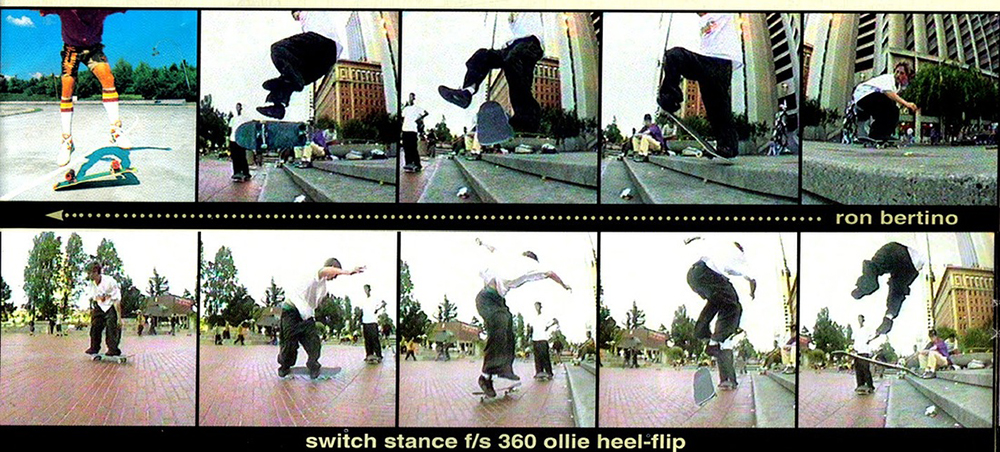
48 Blocks: How’s it been working with ATM, and what’s your role at the company.
Ronnie: I am the domestic sales manager. I have been doing it for about 10 years now. It’s cool. I am still involved with skating. I get to shoot the shit with some cool people over the phone, and actually have better friends that I never met than I have friends here. It’s fucked up to say, but true.
48 Blocks: How often are you skating these days and can we expect to see a new part anywhere soon?
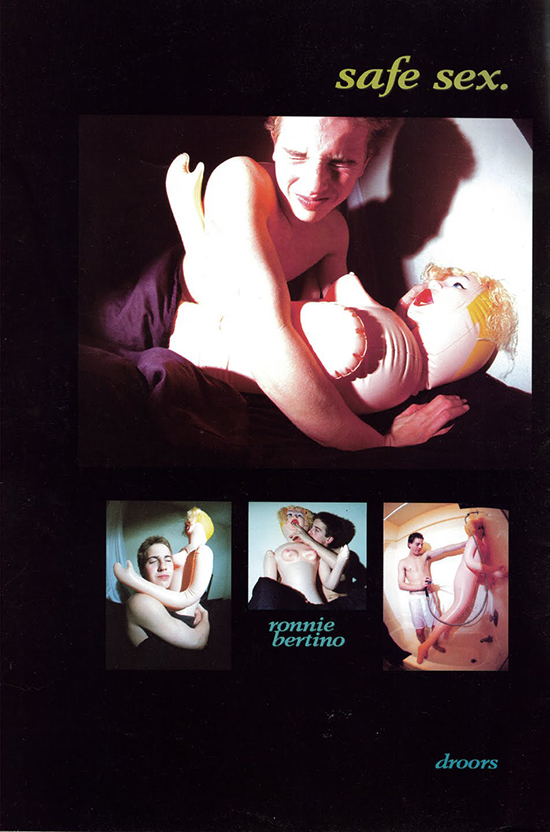 Ronnie: Well I haven’t been skating much at all. But that’s not to say that I don’t get a wild hair up my ass and go roll around. I don’t know if you will see a part or not. I honestly don’t even know at this point.
Ronnie: Well I haven’t been skating much at all. But that’s not to say that I don’t get a wild hair up my ass and go roll around. I don’t know if you will see a part or not. I honestly don’t even know at this point.
48 Blocks: I read in another interview that you had a situation where you owed the IRS $26,000. How did that happen and did you get all of that worked out?
Ronnie: Well, I just didn’t pay taxes. I started making decent money at a young age, and just thought it was monopoly money. I’d go to the bank, take the money out for the day, and do the same thing tomorrow type shit. In the end, I was sick of running. I hadn’t paid any taxes on 1099 forms for my whole career in skating. So shit added up. Finally, after I started working and had a solid address, I started getting letters and realized it wasn’t going to go away until I took care of it. So I worked out a payment plan, and payed $500 a month for 8 years. There were a lot of penalties.
48 Blocks: You’ve got a band. Have you been making a lot of music lately, and doing shows and stuff?
Ronnie: Yeah, I have always wanted to play music, and have been for the past four years. We play a lot of shows in Sand Diego, and it’s picking up steam. So if you’re into old-style punk rock go to myspace.com/pigchampions to see if there is a show coming up near you.
48 Blocks: What skaters should we be keeping an eye out for in your opinion right now?
Ronnie: I have been out of the loop for a bit. So I would have to say all of them. Skating has reached another era where the tricks we thought were impossible are being done. Most of the average kids today are better than most of the pros were then (minus a few standouts from the past). I think it will always break barriers. We will always see something new that we thought would never be done, which is why no matter what skating will always be here.
48 Blocks: Out of all of your video parts that you’ve had, which is your favorite and why?
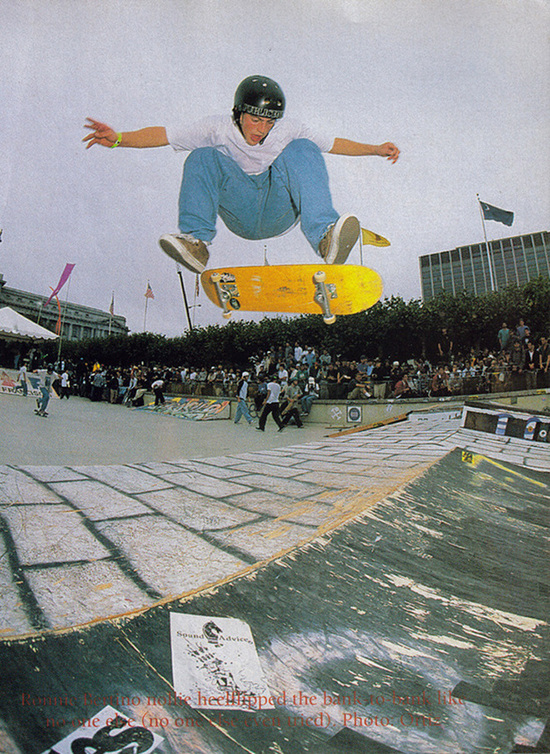 Ronnie: I would say Second Hand Smoke. I feel it was me expressing my skills to the fullest, and a part where I brought my innovation of the sport to the table. They are all good memories. Every now and then, I pop a few of my old video parts in ,and remember the great times I had.
Ronnie: I would say Second Hand Smoke. I feel it was me expressing my skills to the fullest, and a part where I brought my innovation of the sport to the table. They are all good memories. Every now and then, I pop a few of my old video parts in ,and remember the great times I had.
48 Blocks: Being that you’re from that era of innovation, how do you feel about modern skateboarding and the direction in which it’s progressing? Do you think it’s staying true to the foundation laid down in those early days?
Ronnie: Well as far as the skating goes, I think the kids who are doing it are definitely staying real by just skating. It’s all about the fun, and that’s what brings out the progression. There is a few who could kick it with the attitudes. But there was also a few of them in my day as well. So I guess it comes with the territory. I think the mass market is a little more involved than it needs to be, meaning some of the sponsors and ads you see in magazines and some of them that sponsor some of the contests are only there while it is a cool thing. As soon as something happens where there is nothing in it for them, they will turn their back as quickly as they came into it.
48 Block: Give me your top five skaters of all time.
Ronnie: Matt Hensley, Natas Kaupas, Henry Sanchez, Guy Mariano, and Jake Brown.
48 Blocks: What’s the biggest lesson that you’ve learned during your time skateboarding and working in the industry.
Ronnie: There’s two:
1: Pay your damn taxes.
2: I learned to never take anything for granted.
I have had a great life because of skating. I got to travel all over the world, and see things that some people who live to 90 don’t ever get to see. I learned there is always someone out there worse off than me. I learned that life is short, and to value my family and friends because we’re not promised tomorrow. I learned that if I were to die tomorrow, I lived a pretty damn good life. Thank you skateboarding.

